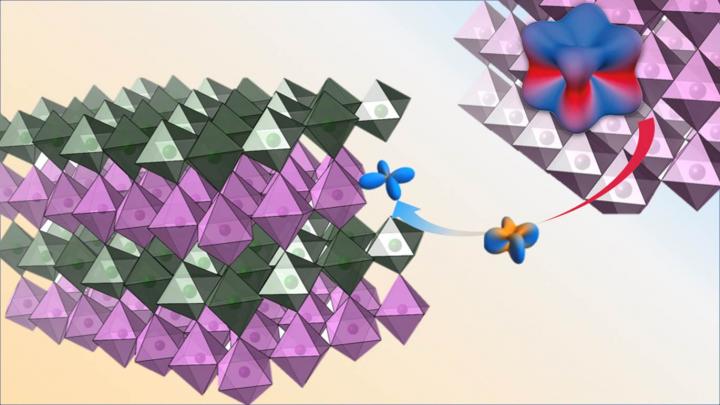Rutgers-led study could lead to greater manipulation of quantum materials and deeper understanding of the quantum state for novel electronics

Credit: Fangdi Wen
Hey, physicists and materials scientists: You’d better reevaluate your work if you study iridium-based materials – members of the platinum family – when they are ultra-thin.
Iridium “loses its identity” and its electrons act oddly in an ultra-thin film when interfaced with nickel-based layers, which have an unexpectedly strong impact on iridium ions, according to Rutgers University-New Brunswick physicist Jak Chakhalian, senior author of a Rutgers-led study in the journal Proceedings of the National Academy of Sciences.
The scientists also discovered a new kind of magnetic state when they created super-thin artificial superstructures containing iridium and nickel, and their findings could lead to greater manipulation of quantum materials and deeper understanding of the quantum state for novel electronics.
“It seems nature has several new tricks that will force scientists to reevaluate theories on these special quantum materials because of our work,” said Chakhalian, Professor Claud Lovelace Endowed Chair in Experimental Physics in the Department of Physics and Astronomy in the School of Arts and Sciences. “Physics by analogy doesn’t work. Our findings call for the careful evaluation and reinterpretation of experiments on ‘spin-orbit physics’ and magnetism when the interfaces or surfaces of materials with platinum group atoms are involved.”
Deep understanding of the phenomenon was achieved thanks to state-of-the-art calculations championed by Rutgers co-authors Michele Kotiuga, a post-doctoral fellow, and Professor Karin Rabe.
The scientists found that at the interface between a layer containing nickel and one with iridium, an unusual form of magnetism emerges that strongly affects the behavior of spin and orbital motion of electrons. The newly discovered behavior is important because quantum materials with very large spin-orbit interaction are popular candidates for novel topological materials and exotic superconductivity.
###
The lead author is Xiaoran Liu, a Moore Foundation EPiQS post-doctoral fellow at Rutgers. Rutgers co-authors also include Heung-Sik Kim, Mikhail Kareev, Fangdi Wen, Banabir Pal, Kristjan Haule and Professor David Vanderbilt. Scientists at Lawrence Berkeley National Laboratory, Argonne National Laboratory and Chinese Academy of Sciences contributed to the study. The Gordon and Betty Moore Foundation supported the experimental part of the study.
Media Contact
Todd Bates
[email protected]
Original Source
https:/
Related Journal Article
http://dx.




